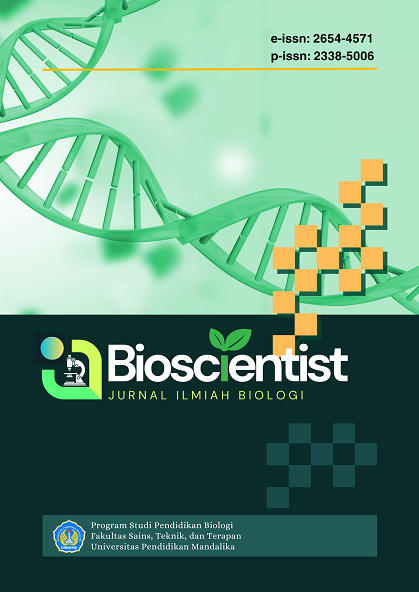Pengetahuan Hakikat Sains (Nature of Sains - NoS) Siswa SMP Negeri dan SMP Islam: Tinjauan Berdasarkan Gender
DOI:
https://doi.org/10.33394/bioscientist.v13i1.14530Keywords:
hakikat sains, gender, SMP Negeri, SMP IslamAbstract
This study aims to analyze the level of junior high school students' knowledge of the Nature of Science (NOS) based on school type (public and Islamic junior high schools) and gender. This study is a descriptive quantitative research involving 180 students with details of 81 students from public junior high schools and 99 students from Islamic junior high schools determined by random sampling technique. The sample consisted of 104 female students and 76 male students. The research data were collected using an instrument in the form of a questionnaire that has been tested for validity and reliability based on a Likert scale developed based on NOS aspects. The results showed that (1) there was a significant difference in the understanding of NOS between students of public and Islamic junior high schools, where students of public junior high schools had a higher level of understanding (good category) than students of Islamic junior high schools (moderate category); (2) there was no significant difference in the understanding of NOS based on gender.References
Adi, Y.K. & Widodo, A. (2018). Pemahaman Hakikat Sains Pada Guru dan Siswa Sekolah Dasar. Edukasi: Jurnal Pendidikan, 10(1).
Anggraeni, S. F., Kaniawati, I., & Efendi, R. (2023). Penerapan argumentation-based science inquiry (absi) dalam meningkatkan literasi sains peserta didik. WaPFi (Wahana Pendidikan Fisika), 8(2), 143-148. https://doi.org/10.17509/wapfi.v8i2.41792
Hardianty, N. (2015). Nature of Science: Bagian Penting Dari Literasi Sains. Prosiding Simposium Nasional Inovasi dan Pembelajaran Sains 2015 (SNIPS 2015)
Hewi, L., & Shaleh, M. (2020). Refleksi Hasil PISA (The Programme for International Student Assesment): Upaya Perbaikan Bertumpu Pada Pendidikan Anak Usia Dini). Jurnal Golden Age, 4(01), 30–41. https://doi.org/10.29408/jga.v4i01.2018
Khayati, D. N. & Raharjo. (2020). Pengembagan Instrumen Tes Berbasis Literasi Sains Untuk Memetakan Critical Thinking dan Practical Skills Siswa Pada Materi Sistem Peredaran Darah Kelas IX SMA. Berkala Ilmiah Pendidikan Biologi, 9(3), 433-442.
Khisfe, R. (2012). Relationship Between Nature of Science (NOS) Understanding and Argumentation Skills: A Role for Counterargument and Contextual Factors. Journal of Research in Science Teaching, 49(4), 489-514.
Lederman, N.G., Bartos, S.A. & Lederman, J.S. (2014). The Development, Use, and Interpretation of Nature of Science Assessments. Dalam M. R. Matthews (Ed.), International Handbook of Research in History Philosophy and Science Teaching, 971-997.
McComas, W.F. (2002).The Nature of Science in Science Education. USA: Kluwer Academic Publishers
Mursidah. (2013). Pendidikan Berbasis Kesetaraan dan Keadilan Gender. Muwazah, 5(2), 277–292
Narut, Y.F. & Supardi, K. (2019). Literasi Sains Peserta Didik dalam Pembelajaran IPA di Indonesia. Jurnal Inovasi Pendidikan Dasar, 3(1), 61-69.
Novick, L. R. and Catley, K. M. (2016). Fostering 21st-century evolutionary reasoning: teaching tree thinking to introductory biology students. CBE—Life Sciences Education, 15(4), ar66. https://doi.org/10.1187/cbe.15-06-0127
Indriani, R. Yusran, K. & Hendrawani. (2021). Pencapaian Pemahaman Hakikat Sains Siswa Dalam Pembelajaran Di Masa Pandemi Covid-19. Jurnal Ilmiah IKIP Mataram, 9(2), 256-266.
Tursinawati. W.A. (2019). Pemahaman Nature of Science (NoS) Di Era Digital: Perspektif Dari Mahasiswa PGSD. Jurnal IPA dan Pembelajaran IPA (JIPI). 3(1), 1-9.
Rahmawati, A., Roshayanti, F., Mulyaningrum, E.R. (2016). Perspektif Siswa SMP Negeri Terhadap NoS (Nature of Science) di Kabupaten Pati. BIOMA 5(2), 12-24.
Rahmawati, Y. P. & Salehudin, M. (2021). Optimalisasi pembelajaran abad 21 pada smp dan sma. Journal of Instructional and Development Researches, 1(3), 112-122. https://doi.org/10.53621/jider.v1i3.67
Rahayu, R., Iskandar, S., & Abidin, Y. (2022). Inovasi pembelajaran abad 21 dan penerapannya di indonesia. Jurnal Basicedu, 6(2), 2099-2104. https://doi.org/10.31004/basicedu.v6i2.2082
Rosyid, A. and Mubin, F. (2024). Pembelajaran abad 21: melihat lebih dekat inovasi dan implementasinya dalam konteks pendidikan indonesia. Tarbawi : Jurnal Pemikiran Dan Pendidikan Islam, 7(1), 1-12. https://doi.org/10.51476/tarbawi.v7i1.586
Safrizal, S., Lenny, Z., & Yulia, R. (2020). Kemampuan literasi sains siswa sekolah dasar di sekolah adiwiyata (studi deksriptif di sd adiwiyata x kota padang). Journal of Natural Science and Integration, 3(2), 215. https://doi.org/10.24014/jnsi.v3i2.9987
Safrizal, S. (2021). Gambaran kemampuan literasi sains siswa sekolah dasar di kota padang (studi kasus siswa di sekolah akreditasi a). El-Ibtidaiy:Journal of Primary Education, 4(1), 55. https://doi.org/10.24014/ejpe.v4i1.12362
Sugiyono. (2010). Metode Penelitian Kuantitatif, Kualitatif, dan R&D. Bandung: CV Alfabeta.
Sumanik, N. B., Nurvitasari, E., & Siregar, L. F. (2021). Analisis profil kemampuan literasi sains mahasiswa calon guru pendidikan kimia. Quantum: Jurnal Inovasi Pendidikan Sains, 12(1), 22. https://doi.org/10.20527/quantum.v12i1.10215
Young, D. M., Rudman, L. A., Buettner, H. M., & McLean, M. C. (2013). The influence of female role models on women’s implicit science cognitions. Psychology of Women Quarterly, 37(3), 283-292. https://doi.org/10.1177/0361684313482109













